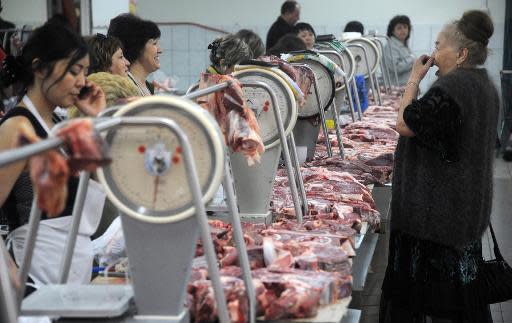Kazakhstan 'buy local' drive battles ruble-cheap Russian imports

Shelves in supermarkets across the ex-Soviet republic of Kazakhstan teem with bright signs championing locally-produced goods over Russian alternatives.
The push to buy local is part of the government's "Made in Kazakhstan" initiative to support domestic producers struggling to match cheap imports from neighbouring Russia, which have enjoyed the competitive benefits of the sanction-battered ruble's dramatic slide in value.
The campaign was launched despite Kazakhstan and Russia having entered the Eurasian Economic Union earlier this year -- the trade bloc backed by both countries' authoritarian presidents.
The blue "KZ" labels of the Buy Kazakh campaign appear to be achieving their objective with some patriotic shoppers.
"I prefer to buy our local goods," said Dina Kim, 29, as she browsed in a supermarket in downtown Almaty, Kazakhstan's largest city.
"I try not to feed my family Russian and Turkish products," she told AFP.
Others, such as Vera, 45, are unconvinced.
"The government told us integration with Russia would make products cheaper," she said.
"When it finally happens, they're telling us to buy something that is more expensive."
- Product bans -
Authorities in Astana have recently slapped bans on fuel and foods -- from chocolate to pork products -- imported from its strategic Russian partner, citing alleged sanitary breaches.
Moscow has responded with tit-for-tat measures as both government seek to protect affected businesses.
Following complaints by Kazakh confectionery giant Rakhat that its sales have plummeted 20-30 percent this year due to Russian competitors selling their products up to 60 percent cheaper, Astana moved to bolster the company's fortunes this month by banning Russian chocolate.
Prohibitions are also roiling fuel products after Kazakhstan suspended imports for 45 days on March 5, citing a domestic surplus.
Last week the Kazakh government renewed restrictions on Russian diesel imports, with local refiners standing to benefit as farmers prepare for the spring sowing season.
Officials in both countries deny problems in bilateral relations, with Putin's spokesman Dmitry Peskov recently calling talk of a trade war an "exaggeration".
Kazakhstan's Deputy Economy Minister Kairbek Uskenbaev said the bans concerned "specific companies," and would not damage the country's "most friendly" relations with Russia.
The flurry of trade manoeuvres come as 74-year-old Kazakh President Nursultan Nazarbayev was set to sweep a virtually uncontested snap presidential poll on Sunday, and extend his 26-year reign in ex-Soviet Central Asia's most prosperous country for a further five years.
Yet low prices for the energy-rich country's chief export, crude oil, and the enduring weakness of the ruble have created an uncertain backdrop to the ballot.
"The situation is not as bad as before the 1999 (presidential) vote, which came after the Russian debt default and the Asian financial crisis, but it is still quite serious," said Tulegen Askarov, president of Biz Media business journalism centre.
- 'Stopgap measures' -
The "buy local" campaign and import bans are merely "stopgap measures," said Askarov.
"Once elections are over, the government will have to come up with a more concrete and perhaps less populist strategy."
The wide-ranging restrictions have also raised questions about the logic behind the Eurasian Economic Union, when three of the bloc's four members are sparring with one another.
Belarus, another member, has also engaged in trade disputes with Moscow, as the fallout from low energy prices and Western sanctions over Russia's policies in Ukraine reverberate throughout the former Soviet empire.
"Although these actions violate the spirit of Eurasian integration, it's understandable that in extraordinary circumstances national governments may intervene to regulate the terms of trade," said Igor Yushkov, an analyst at the National Energy Security Fund, a Moscow-based consultancy close to the Kremlin.
Rumours have swirled that after the election Kazakhstan will significantly devalue its currency, the tenge, for the second time in just over a year in response to gloomy energy price forecasts and economic stagnation in Russia.
In February last year, the country's central bank shaved a fifth off the tenge's value, shocking depositors and sparking rare protests in Almaty.
Ivan Sauer, director of Rodina, a large Kazakh agribusiness firm, says he is hopeful the government can steer the economy back to stability without "extreme measures".
"We producers find ourselves in unique geopolitical circumstances that are not of our making," Sauer told AFP.
"We just have to wait and hope the ruble finds its level again."

 Yahoo Finance
Yahoo Finance 